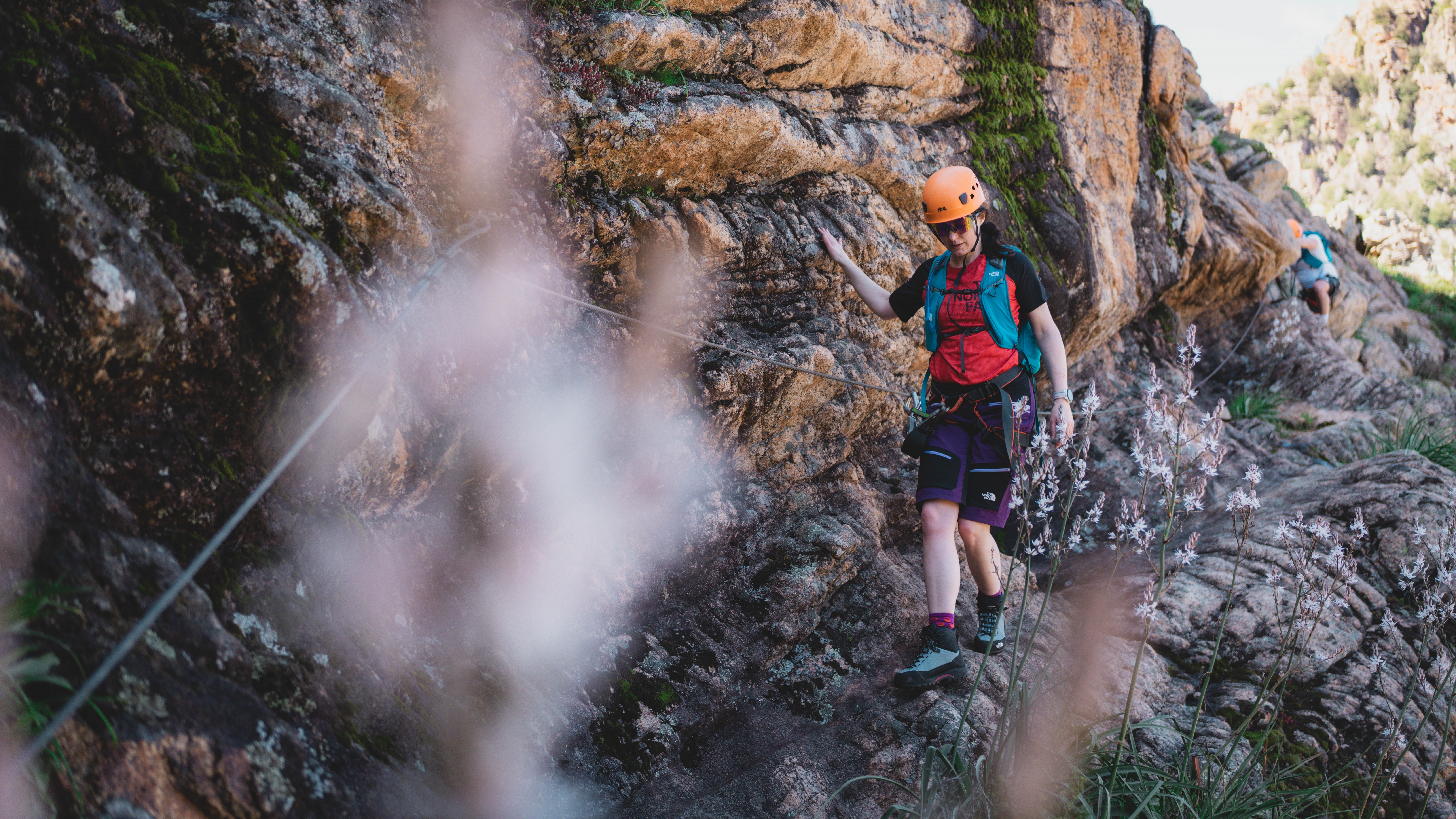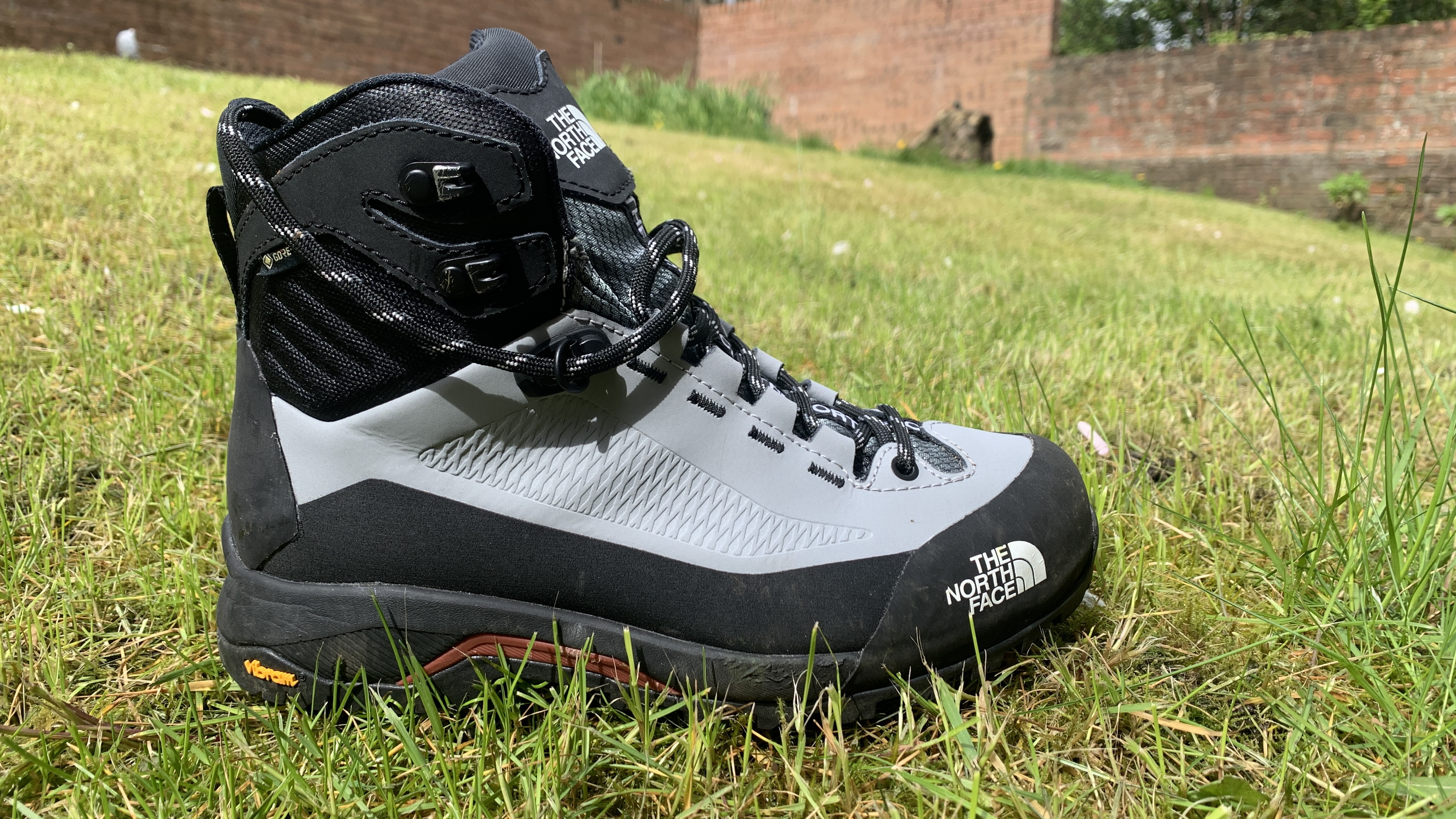
Meet the reviewer
The North Face Verto Gore-Tex Alpine Mid Boots: first impressions
Some hikes require more protection than your average hiking boot provides, and these boots are not your average hiking boots. Built for hiking and via ferratas, the leather uppers are well-reinforced to support your ankles and protect your feet from rocks. Meanwhile the grippy Vibram soles aren't just for slick surfaces – a climbing zone at the toe is good for easy edging.
You might be surprised, then, to learn that they're also really lightweight. For as rugged as they are, we experienced out-of-the-box comfort in them while wearing them for a full afternoon on one of Corsica's via ferratas.
• List price: $230 / £180
• Gender specification: Men's and women's sizing available
• Sizes: Men's7 - 14 US, 6 - 13 UK / Women's 5 - 11 US, 3 - 9 UK
• Weight (women's UK 4, per shoe): 14.8 oz / 420 g
• Materials: Majority leather upper, Vibram sole, recycled Gore-Tex lining
• Colors: Indigo Stone, Monument gray, Red, Asphalt Grey
• Best use: Hiking, via ferrata
Though they excel on dry, rocky surfaces where you might encounter surprisingly slippery areas, a full Gore-Tex waterproof lining means they're not a bad choice for a boggy hike either. The membrane has been watertight on your tests so far, but the top couple of inches of the tongue and top inch of the ankle cuff aren't waterproof, so it's possible that you could get wetter than planned without gaiters in really torrential conditions, but every boot is eventually breachable.
The lacing system leaves plenty of options for a customized fit, however the toe box is on the narrow side, so make sure you size up as always. Despite the rock plate in the sole, the uppers have a surprising amount of flex which makes for a comfortable ride. You may not need this much protection for an everyday hike, but if you're planning on adventuring on rock, check these out for a comfortable option.
The North Face Verto Gore-Tex Alpine Mid Boots: in the field

I recently got to test out these boots during a press trip with The North Face to Corsica, where we tested their new kit out across a variety of activities: hiking, mountain biking and on a via ferrata.
Though it's not recommended, I didn't break the boots in before the trip – I just pulled them on for the via ferrata and spent the next fours hours clambering over rocks and ziplining across gorges in them.
Here’s how they performed:
Sizing and fit
I tested a size 4 UK which is my go-to size for hiking boots to give my feet room to swell. At first glance, I was worried because the toe box appears really narrow, which is something I hate, but actually I didn't find them restrictive at all and I think they're wider than they look around the base of my toes. In any case, once laced, I was able to achieve a nice snug fit around my ankle and heel with room for my foot to swell. They come up about an inch higher than my ankle bone.

Comfort and temperature regulation
I wouldn't have been surprised if I had a bit of rubbing or chafing with these boots, since I didn't give them any break-in time and they come up higher than I'm used to, and I wouldn't have complained about it either. However, I managed to wear them for hours on my first go without any complaints whatsoever. They're nicely padded, with enough flex in the upper that I was able to walk comfortably on some fairly grueling terrain.
On that first day, it was actually sunny and quite warm, and I didn't need the waterproofing. Obviously, you lose some breathability with a waterproof membrane, but I really wasn't experiencing sweaty or uncomfortable feet. Lately, I've been wearing them for boggier hikes in colder weather back in Scotland and they're good at keeping my feet warm.
Weatherproofing and protection
The waterproof membrane has held up to my tests so far, which mostly just involve walking on wet trails and through very shallow streams. However, I did notice that the membrane appears to end a couple of inches from the top of the tongue and about an inch from the top of the ankle cuff. If so, it's definitely possible that a deeper bog or a wetter day could eventually spell a breach for your feet if you're not prepared with gaiters.
On the via ferrata, I was more concerned about protection from rocks than rain and was really pleased with how these sheltered my feet from a bashing. They're well reinforced all the way around so I could walk without worrying, while some of my group had opted to wear lighter hiking shoes due to the warm weather and regretted their decision.
The high cuff and lacing system also meant my ankle was held in place nicely, which in turn meant I could walk on really challenging terrain without worrying about stumbling.

Grip and stability
A Vibram sole is always a good start for a grippy outsole, but it's not the be all and end all of traction. In this case, I've found the rubber material and deep lugs to grab onto steep, rocky surfaces, and while I don't exactly understand the technology of the climbing zone at the toe, I was surprised at how well I could climb in them. Back at home, they handle mud well, which is a relief, as I'm much more likely to encounter mud than a via ferrata in Scotland.
Thanks to the rock plate and not too much of a drop, I found a nice stable ride underfoot even when the terrain was anything but.
The North Face Verto Verto Gore-Tex Alpine Mid Boots the bottom line
These boots might not make sense for every hike, but if you're planning on exploring a lot of rock and want something that's protective yet lightweight and comfortable, they're worth trying on. Lots of rocky hikes don't require waterproofing, but most similar boots come with membranes. The La Sportiva Trango Tower GTX are more expensive, but have a lot of similar characteristics if you want to weigh these up against another boot before making your final decision.







